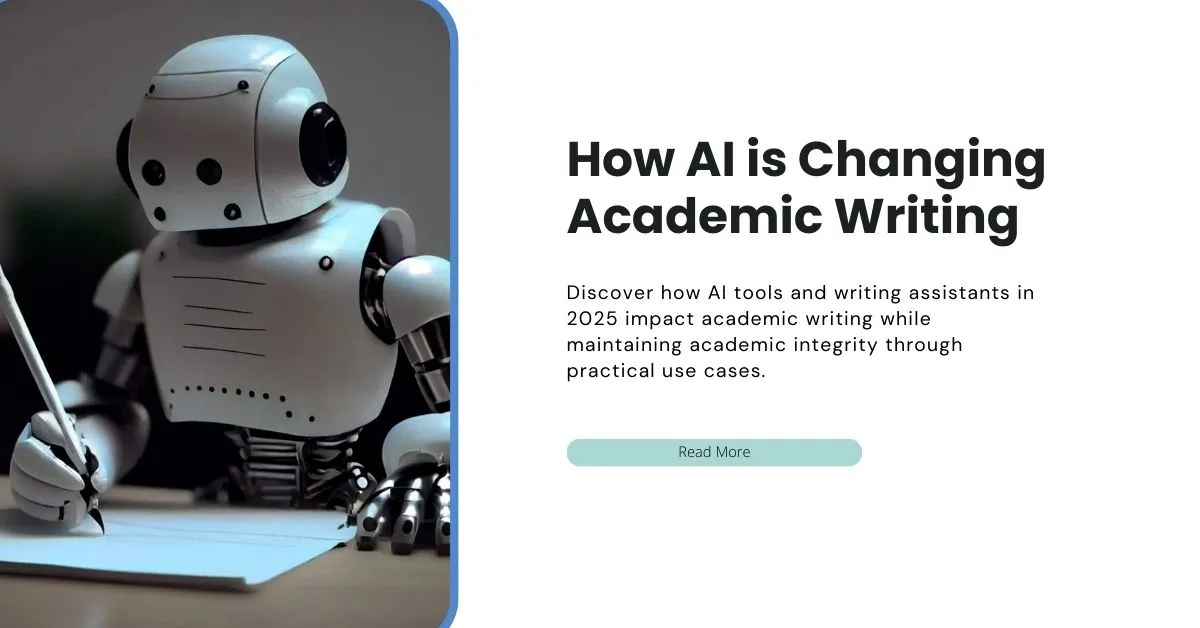AI in academic writing has transformed scholarly communication in 2025, with generative AI tools becoming essential resources for students, researchers, and educators. Artificial intelligence now assists with research, drafting, editing, and citation management while raising important questions about academic integrity and the future of original scholarship.
Key Ways AI is Transforming Academic Writing in 2025
| Application Area | AI Capabilities | Academic Benefits | Ethical Considerations |
|---|---|---|---|
| Research Assistance | Literature synthesis, data analysis | Faster research, comprehensive coverage | Source verification, accuracy concerns |
| Writing Support | Grammar checking, style improvement | Enhanced writing quality, error reduction | Over-reliance, skill development |
| Citation Management | Automated formatting, source tracking | Time savings, consistency | Accuracy verification needed |
| Content Generation | Outline creation, idea development | Overcoming writer’s block | Plagiarism concerns, originality |
| Language Translation | Multilingual support, accessibility | Global research collaboration | Cultural nuance preservation |
The role of AI in academic writing extends far beyond simple writing assistance. AI tools now enhance academic writing through sophisticated writing assistants that understand disciplinary conventions, AI systems that analyze argument structure, and generative artificial intelligence platforms that support complex research and writing tasks across multiple disciplines.
AI and the Evolution of Academic Writing
Academic writing has undergone unprecedented transformation in 2025, driven by advances in generative AI and AI technologies that reshape how scholars approach research and writing. Artificial intelligence in academic writing now encompasses everything from AI-powered writing tools that assist with drafting to sophisticated AI systems that analyze research patterns and suggest innovative connections across disciplines.
This evolution represents more than technological advancement; it fundamentally challenges traditional notions of authorship, originality, and academic integrity within scholarly communities. As AI writing tools become increasingly sophisticated, the academic community must navigate complex questions about responsible AI use while maintaining academic integrity standards that preserve the value of original scholarship.
The writing process itself has been transformed as AI can help researchers overcome creative blocks, generate preliminary ideas, and refine arguments through iterative collaboration with intelligent systems. AI tools for academic writing now offer specialized support for different disciplines, from scientific writing assistance to humanities research support that understands nuanced argumentation patterns.
However, this transformation comes with significant challenges. AI hallucinations and accuracy concerns require careful verification of AI-generated content, while questions about academic misconduct arise when AI assistance crosses from helpful support to inappropriate substitution for original thinking. The academic standards that govern scholarly work must evolve to address these new realities while preserving the critical thinking and analytical rigor that define quality academic work.
What Role Does AI Play in Academic Writing Today?
Research and Information Processing
AI tools have revolutionized how researchers approach information gathering and analysis in 2025. Generative AI platforms can quickly process vast amounts of academic literature, identifying relevant sources, synthesizing key findings, and highlighting research gaps that might take human researchers weeks to discover independently.
AI can assist scholars in conducting comprehensive literature reviews by analyzing thousands of papers simultaneously, identifying thematic patterns, and suggesting connections between seemingly disparate research areas. This capability particularly benefits interdisciplinary research where AI tools can help researchers navigate unfamiliar fields and identify relevant methodologies.
The use of AI tools in research extends to data analysis, where AI systems can identify statistical patterns, generate visualizations, and suggest analytical approaches that enhance research quality. Advanced AI platforms now offer specialized support for different types of writing, from empirical research papers to theoretical analyses, adapting their assistance to match disciplinary conventions.
AI assistance in research also includes translation services that make global scholarship more accessible, enabling researchers to engage with sources published in multiple languages. This capability expands the scope of possible research while supporting more inclusive and comprehensive scholarly investigations.
Writing Enhancement and Editing
AI writing assistants have evolved far beyond basic grammar checking to offer sophisticated writing support that understands academic writing conventions and disciplinary standards. AI tools can now analyze argument structure, identify logical gaps, and suggest improvements that strengthen scholarly communication effectiveness.
AI enhances the editing process by identifying inconsistencies in tone, style, and formatting that human editors might miss during manual review. Formatting that human editors might miss during manual review. Many common mistakes in academic writing also relate to such inconsistencies. AI-powered writing platforms can maintain consistent writing styles across lengthy documents while ensuring adherence to specific citation formats and academic conventions.
The use of generative AI in drafting has become increasingly sophisticated, with AI tools capable of generating preliminary outlines, topic sentences, and transitional passages that maintain logical flow throughout complex arguments. However, responsible use requires treating these outputs as starting points for human refinement rather than finished products.
AI can make the revision process more efficient by suggesting alternative phrasings, identifying repetitive language, and recommending structural improvements that enhance clarity and persuasiveness. These capabilities are particularly valuable for non-native English speakers who benefit from AI writing support that improves linguistic accuracy while preserving their original ideas.
AI Tools Commonly Used in Academic Writing
Writing and Editing Platforms
AI-powered platforms like Grammarly, QuillBot, Jasper, and ChatGPT have become essential in academic writing. These tools assist with grammar, style, paraphrasing, and generating outlines. In 2025, they are increasingly integrated into university learning systems, offering real-time feedback and personalized writing support.
Other specialized platforms, such as Turnitin Draft Coach and Writefull, focus specifically on academic writing by checking citations, research relevance, and maintaining academic tone.
How AI Improves Research and Writing Efficiency
Faster Information Retrieval
AI tools help students and researchers sift through vast amounts of data in seconds, identifying relevant sources and summarizing complex research papers.
Enhanced Drafting and Outlining
Writing assistants generate structured outlines, topic sentences, and thesis ideas, allowing writers to focus more on critical analysis instead of repetitive tasks.
Language Support
For non-native English speakers, AI offers grammar correction, clarity suggestions, and vocabulary enhancements making academic work more precise and professional.
Productivity Gains
Automated referencing, citation generation, and proofreading reduce time spent on formatting and editing, giving students more bandwidth to engage in higher-level thinking.
The Risks: Plagiarism, Overreliance, and Accuracy Concerns
Academic Integrity Challenges
AI-generated content raises concerns about plagiarism, originality, and ghostwriting. While tools can assist learning, misuse may undermine academic honesty.
Overreliance and Skill Development
Excessive dependence on AI risks limiting students’ ability to think critically, develop arguments, and write independently—core academic skills.
Quality and Accuracy Issues
AI tools sometimes generate inaccurate information, fabricated references, or biased content. Without proper fact-checking, students may compromise academic quality.
AI and Academic Integrity: Ethical Debates in 2025
Defining Appropriate Use
The debate centers on distinguishing AI as a learning assistant versus a content creator. Responsible use means leveraging AI for guidance, not replacing human effort.
Institutional Response
Universities are introducing AI-use guidelines, ensuring transparency in assignments. Some institutions now require disclosure of AI assistance in research papers.
Student and Researcher Perspectives
Many students see AI as a helpful writing companion, while researchers emphasize caution, fearing its misuse may devalue original scholarly contributions.
Institutional Policies Toward AI in Academic Writing
University Guidelines and Standards
Most universities now define clear policies for AI usage, specifying when tools are acceptable (e.g., grammar checking) and when they breach academic integrity (e.g., full essay generation).
Enforcement and Detection
AI-detection software, plagiarism checkers, and disclosure statements are becoming standard. Turnitin and similar platforms now include AI-generated content detection.
Future Policy Development
Policies will likely evolve to balance innovation and integrity, with institutions creating frameworks that encourage ethical AI use while preserving academic standards.
AI vs Human Writing: What Stays Unique to Humans?
Creative and Critical Analysis
AI can generate ideas, but only humans can synthesize diverse perspectives, critique theories, and propose innovative research questions.
Contextual Understanding and Nuance
Human writers bring cultural, social, and historical awareness that AI cannot fully replicate. Academic arguments often require subtle reasoning that goes beyond patterns.
Relationship and Community Building
Teaching, peer collaboration, and mentorship—core to academia—are inherently human experiences that AI cannot replace. Writing also involves emotional expression, which remains uniquely human.
Future Trends: How AI Will Shape Academic Writing Beyond 2025
Technological Advancements
Future AI tools will likely include deeper integration with academic databases, real-time citation verification, and more advanced fact-checking to improve accuracy.
Educational Integration
AI may become a formal part of academic curricula, teaching students how to use writing assistants responsibly while developing independent thinking skills.
Research and Publishing Evolution
Scholarly journals and publishers may adopt AI for peer-review assistance, plagiarism detection, and language editing—speeding up publication processes while maintaining academic integrity.
Conclusion:
The transformation of academic writing through AI in 2025 represents both unprecedented opportunity and significant challenge for scholarly communities worldwide. AI tools offer powerful writing assistance that can enhance research productivity, improve communication quality, and democratize access to sophisticated writing support. However, responsible use requires careful attention to academic integrity, critical thinking development, and the preservation of human creativity and insight that drive scholarly progress.

